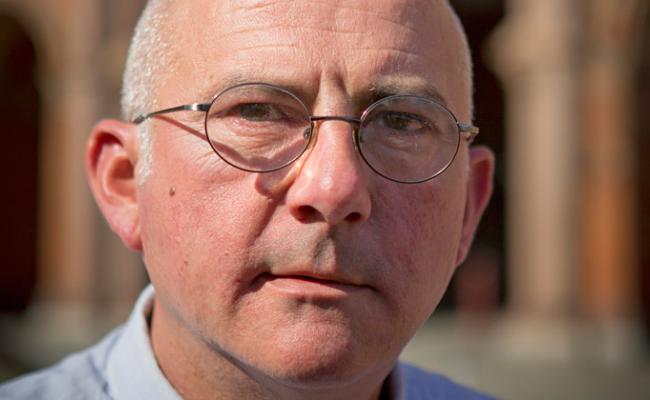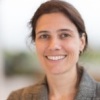“Sometimes journalists can step in when police and government fail.”
by - 9th December 2016

ANDREW Norfolk remembers the time when mentioning religion at work was so taboo that ‘it was as if you had burped at a party’.
That was in a regional newsroom in the 1990s. But, however that ‘kneejerk liberal, secular groupthink’ developed, ‘9/11 was the moment when – if you’d ever thought it was permissible to get by without understanding religion – that just didn’t work anymore.’
Nonetheless, religion today is not something about which people are so much embarrassed as ignorant, and increasingly so – ‘even of Christianity’, he argues.
‘To be a journalist in this country, you need to understand politics, not just the difference between Conservative, Labour and Lib-Dem; you need to understand within each of those parties the divergence of belief, and how that impacts on what policies they want to enact.
But regarding religion, ‘we’re still a million miles from that, from understanding how millions of people in this country live and are motivated to act. You cannot do that without understanding all the nuances and all the grey areas, all the blacks and all the whites, where those beliefs come from and why.’
Norfolk worked on the Scarborough Evening News and the Yorkshire Post before joining The Times in 2000. His focus was not religion, although his Christian upbringing (Baptist father, Methodist mother, ordained uncles) left him broadly aware of the variations within Christianity, and gave him an expectation that religion should provide ‘these woolly, terribly Anglican concepts like tolerance, compassion, justice, fairness.’
His journey into religious literacy, the subject of a talk he will be giving for Lapido in London’s Frontline Club on 12 December, began after the 7 July 2005 London bombings. Visiting the suburb of Leeds where three of the four bombers had come from, ‘. . . it was immediately obvious to me how little I knew, for example, about the theology of the mosques the bombers had prayed in’.
Before then, he says, he knew about Sunni and Shia, about moderates and extremists, and about Salafi-Wahhabis from Saudi Arabia.
But given that most British Muslims come not from the Middle East but Pakistan, Bangladesh and India, an important distinction was the difference between mosques linked to Barelvi and the more austere Deobandi Islam, two dominant Sunni traditions in south Asia.
The Times realised they had no journalist focusing on Islam in Britain.
So Norfolk’s news editor invited him to spend six months learning about Islam: he travelled to Pakistan, read the Quran and more than a hundred other books, which he found ‘fascinating’.
This process would lead to his producing early on some long-form investigative pieces that uncovered extremist teaching in some Deobandi mosques.
What he hadn’t expected to uncover was the grooming of teenage white girls by gangs of Asian men – and the blind eye turned by the local council and police force. For this he won the Journalist of the Year award at the 2014 British Journalism Awards, among other accolades.
Initially there was no connection between that and Islam. ‘That investigation started because I'd grown increasingly uneasy about an unacknowledged pattern of sex offending involving groups of (largely Pakistani heritage) men and young teenage girls. Religion, initially, had nothing to do with it.
‘Only as I continued to work on the story and was trying to understand why and how this crime model had put down such strong roots in certain communities, I came to believe that in addition to cultural issues there were certain aspects of Islamic thinking, plus a distorted sort-of street Islam perspective, which played a role in making such group crimes more likely, and potentially more acceptable, within a criminal subculture of the Pakistani Muslim community as opposed to, e.g., the British Sikh or Hindu communities.’
Norfolk has faced accusations of racism and Islamophobia, including from other journalists. He replies: ‘You don’t help the future by ignoring hard truths.’
Referring to his reporting on the grooming of white girls by Asian men he adds: ‘We reclaimed that story from the racists.’
Reluctance
As he would later report, local authorities and police were reluctant to intervene, fearing to tread in a minefield in which race and religion both featured. Apart from some campaigning work by local Labour MP Ann Cryer that Norfolk describes as ‘brave’, most interventions on the issue came from the far-right, namely the British National Party’s Nick Griffin. At the end of the day, it was about the abuse of vulnerable girls.
‘We agonised from the start about how to describe these men,’ he says. ‘When we began researching past prosecutions that fitted the crime pattern, we found that of the 56 men convicted, 50 were Muslim and the vast majority were of Pakistani heritage, so from the word go we described them as a sub-section within the Pakistani community rather than the Islamic community.’
However, he argues that both religion and culture were important factors.
Culturally, he says many of the community are poorly educated and come from one rural part of Pakistani Kashmir that still serves as a source of spouses who move to Britain with no understanding of its language or culture.
However, he believes Islamic teaching is partly responsible, in two ways. Firstly, because although Islam prohibits sex outside marriage, all four schools of Islamic jurisprudence teach that a girl can be married when she reaches puberty, which ‘on average in Britain is 11’.
‘When the Muslim Brotherhood Government took power in Egypt, one of the new laws they were going to introduce was to lower the age of consent from 18 to 13, and disappointment was voiced by certain Salafis and Muslim Brotherhood scholars that it wasn’t nine.
‘Islamic State had nine as the permissible age for marriage.’ He pauses. ‘I don’t think there’s the same sense of wrongness and shame in some cases about having sex with a 12-year-old girl.’
A second factor is Islam’s division of the world into Dar al Islam (the land of Islam, where Islamic rule is established) and Dar al Harb (the land of war, where Islamic rule has not been established) – or at least a ‘twisted street understanding’ of this worldview.
‘Some of these kids have got an idea – probably because it’s quite convenient for them – that Britain’s been designated a land of war, so certain things have become permissible in terms of “the enemy”; I think some of these guys think it’s okay to do stuff to white girls that they wouldn’t dream of doing to Muslim girls.’
One scholar who condemned the perpetrators’ actions told him their attitude was ‘You wouldn’t sh*t in your own back yard.’
Emotive
The extent to which Muslim immigrants have integrated into British society varies widely and remains a highly emotive question, but Norfolk adds that in some cases, efforts have been hindered by ‘white flight’. He mentions a Muslim friend who moved to a mainly white suburb of Bradford to give his daughters the best start in life, only to watch with increasing disillusionment as one by one the white families moved away.
Norfolk is not a sound-bite journalist; he doesn’t tweet; his articles take him weeks, months or longer. He answers questions with anecdotes rather than hurried generalizations – the Muslim taxi driver’s take on the news, the chat with the Bangladeshi curry-house waiter.
By prioritizing religious literacy over political correctness, Norfolk gained the tools to hold three communities to account – the perpetrators, the Muslim community, some of whom welcomed the opportunity to confront the issue, and the liberal establishment, some of whom lost their jobs.
The award judges praised him for ‘journalism which has made a difference, which gave a voice to people who no-one was listening to, and which proved that sometimes journalists can step in when police, local and central government have all failed.’
 Abigail Frymann Rouch is a London-based freelance journalist and has an MA in Middle Eastern studies. She reported on the migrant crisis from Greece for The Independent, and has written for The Telegraph and others. She was foreign editor and latterly online editor of the Catholic weekly The Tablet. Photo: Davie Tidd.
Abigail Frymann Rouch is a London-based freelance journalist and has an MA in Middle Eastern studies. She reported on the migrant crisis from Greece for The Independent, and has written for The Telegraph and others. She was foreign editor and latterly online editor of the Catholic weekly The Tablet. Photo: Davie Tidd.
